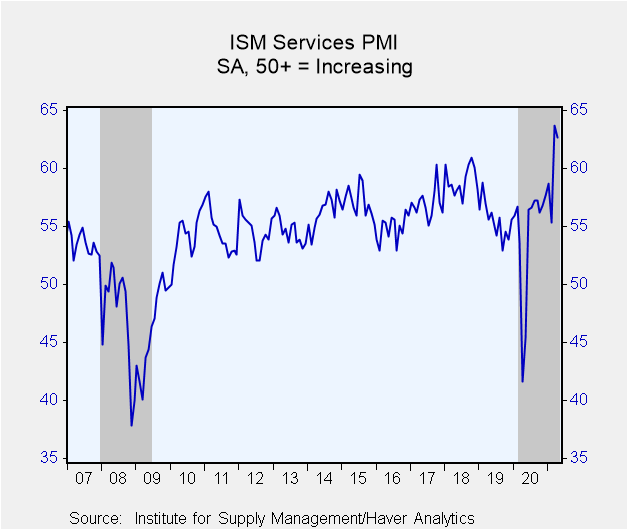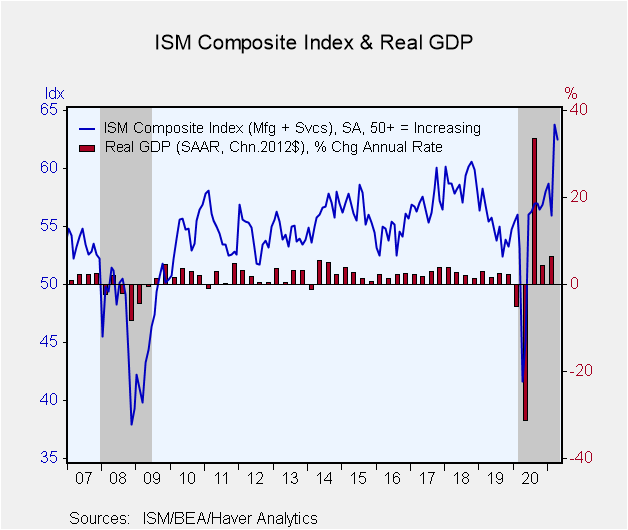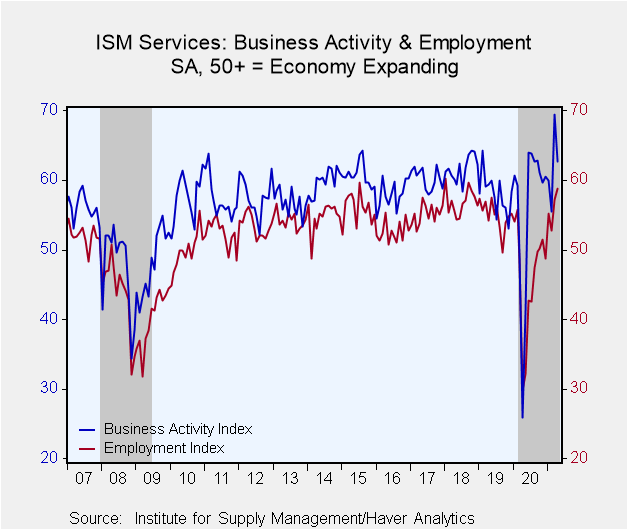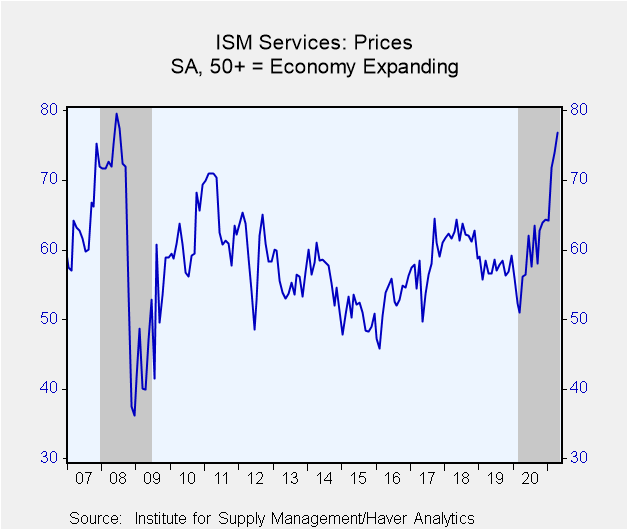 Global| May 05 2021
Global| May 05 2021U.S. ISM Services Index Unexpectedly Edges Lower in April
by:Tom Moeller
|in:Economy in Brief
Summary
• Components are mixed. • New orders decline, but employment increases. • Pricing improves to July 2008 high. Service sector activity weakened last month along with the factory sector, as reported Monday. The Composite Index of [...]
• Components are mixed.
• New orders decline, but employment increases.
• Pricing improves to July 2008 high.
Service sector activity weakened last month along with the factory sector, as reported Monday. The Composite Index of Services Activity from the Institute for Supply Management fell to 62.7 last month from the record 63.7 during March. (The series dates back to July 1997.) A rise in the index to 58.5 had been expected in the Action Economics Forecast Survey.
The ISM indicated that "Production-capacity constraints, material shortages, weather and challenges in logistics and human resources continue to affect deliveries, which has resulted in a reduction of inventories."
Haver Analytics constructs a composite index combining the services index and the manufacturing reading. The composite index fell to 62.5 from the record 63.8 reached in March. During the last 10 years, there has been a 52% correlation between the index level and the q/q change in real GDP. The composite is based on GDP shares.
Changes in the services sub-index series were mixed during April. The business activity reading fell to 62.7 from the record 69.4 in March. The new orders index weakened to 63.2 from the record 67.2 in March. To the upside was the employment measure which rose to 58.8 after improving to 57.2 in March. An increased 27% of respondents reported more hiring while a lessened nine reported fewer jobs. Indicating slower delivery speeds, the supplier delivery series rose to 66.1 from 61.0. It was the highest level since May of last year, up from a low of 55.0 in September.
The prices index strengthened to 76.8 last month after rising to 74.0 in March. The figure was the highest since July 2008 and compared to a low of 50.9 in March 2020. A strengthened 58% of respondents reported higher prices while a negligible one percent reported price declines. The percentage reporting no change in prices fell sharply to 40% and remained well below its 80% high in February of last year.
The export orders series rose to 58.6 and remained up from 47.0 in January. The imports index jumped to 55.7, its highest level since March 2017. The order backlogs index also rose to 55.7, its highest level since August of last year. These series are not seasonally adjusted and are not included in the nonmanufacturing composite.
The ISM figures are available in Haver's USECON database, with additional detail in the SURVEYS database. The expectations figure from Action Economics is in the AS1REPNA database.
| ISM Services Survey (SA) | Apr | Mar | Feb | Apr '20 | 2020 | 2019 | 2018 |
|---|---|---|---|---|---|---|---|
| Services PMI | 62.7 | 63.7 | 55.3 | 41.6 | 54.3 | 55.5 | 59.0 |
| Business Activity | 62.7 | 69.4 | 55.5 | 25.9 | 55.8 | 58.0 | 61.6 |
| New Orders | 63.2 | 67.2 | 51.9 | 32.5 | 55.6 | 57.6 | 61.5 |
| Employment | 58.8 | 57.2 | 52.7 | 29.7 | 46.0 | 55.0 | 56.9 |
| Supplier Deliveries (NSA) | 66.1 | 61.0 | 60.8 | 78.3 | 59.7 | 51.5 | 55.8 |
| Prices Index | 76.8 | 74.0 | 71.8 | 56.1 | 58.6 | 57.5 | 62.0 |
| ISM Mfg. & Services (Haver Composite) | 62.5 | 63.8 | 55.9 | 41.6 | 54.1 | 55.0 | 58.9 |
Tom Moeller
AuthorMore in Author Profile »Prior to joining Haver Analytics in 2000, Mr. Moeller worked as the Economist at Chancellor Capital Management from 1985 to 1999. There, he developed comprehensive economic forecasts and interpreted economic data for equity and fixed income portfolio managers. Also at Chancellor, Mr. Moeller worked as an equity analyst and was responsible for researching and rating companies in the economically sensitive automobile and housing industries for investment in Chancellor’s equity portfolio. Prior to joining Chancellor, Mr. Moeller was an Economist at Citibank from 1979 to 1984. He also analyzed pricing behavior in the metals industry for the Council on Wage and Price Stability in Washington, D.C. In 1999, Mr. Moeller received the award for most accurate forecast from the Forecasters' Club of New York. From 1990 to 1992 he was President of the New York Association for Business Economists. Mr. Moeller earned an M.B.A. in Finance from Fordham University, where he graduated in 1987. He holds a Bachelor of Arts in Economics from George Washington University.
More Economy in Brief
 Global| Feb 05 2026
Global| Feb 05 2026Charts of the Week: Balanced Policy, Resilient Data and AI Narratives
by:Andrew Cates










